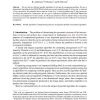Free Online Productivity Tools
i2Speak
i2Symbol
i2OCR
iTex2Img
iWeb2Print
iWeb2Shot
i2Type
iPdf2Split
iPdf2Merge
i2Bopomofo
i2Arabic
i2Style
i2Image
i2PDF
iLatex2Rtf
Sci2ools
SPAA
1990
ACM
1990
ACM
Parallel Algorithms for Arrangements
We give the first efficient parallel algorithms for solving the arrangement problem. We give a deterministic algorithm for the CREW PRAM which runs in nearly optimal bounds of O(log n log n) time and n2/ log n processors. We generalize this to obtain an O(log n log n)-time algorithm using nd / log n processors for solving the problem in d dimensions. We also give a randomized algorithm for the EREW PRAM that constructs an arrangement of n lines on-line, in which each insertion is done in optimal O(log n) time using n/ log n processors. Our algorithms develop new parallel data structures and new methods for traversing an arrangement. Key Words. Parallel algorithms, Computational geometry, Arrangement problem, Incremental algorithms.
Algorithms | Arrangement Problem | Distributed And Parallel Computing | Parallel Algorithms | SPAA 1990 |
Related Content
| Added | 11 Aug 2010 |
| Updated | 11 Aug 2010 |
| Type | Conference |
| Year | 1990 |
| Where | SPAA |
| Authors | Richard J. Anderson, Paul Beame, Erik Brisson |
Comments (0)

